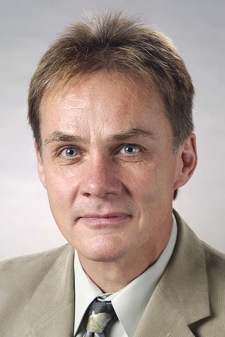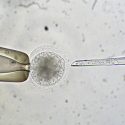Arboretum director to return to teaching
Kevin McSweeney, a University of Wisconsin–Madison soil scientist who has directed the university’s internationally famous Arboretum since 2004, announced this week that he is relinquishing that administrative post and returning to the faculty.

McSweeney
“I am proud to have served as Arboretum director and am especially pleased to have worked with high quality and dedicated colleagues on a broad array of exciting and demanding projects,” McSweeney says. “I look forward to engaging in several new teaching initiatives along with a number of research projects when I return full-time to the faculty”.
McSweeney was appointed interim director of the Arboretum in 2004 and was named director in August of 2005. Under his direction, the Arboretum continued its long tradition of restoration science and confronted significant challenges posed by the growth of the city around it. Problems such as urban storm water runoff have been persistent threats to the integrity of its restored landscapes.
McSweeney placed an emphasis on working with neighbors as Arboretum staff developed plans for managing storm water and other projects.
He helped launch a fundraising campaign in support of Longenecker Gardens and led events recognizing the 75th anniversary of the Arboretum. In addition, McSweeney was able to secure a Dane County Parks Commission grant to provide pedestrian access to the southeast corner of the Arboretum’s Grady Tract, south of the Beltline, and for bicycle amenities on the Cannonball Bike Path.
Graduate School Dean Martin Cadwallader says McSweeney played a key leadership role for one of the university’s most publicly valued and visible research settings.
“Kevin McSweeney has given us seven years of valuable leadership at a time when the mission of the Arboretum has never been more important,” Cadwallader says. “The Arboretum remains a critical laboratory for restoration science and for devising new approaches to mitigating the human impact on Wisconsin landscapes, in particular, and Professor McSweeney was tireless in his support of that mission.”
The UW–Madison Arboretum is a 1,260-acre natural laboratory noted for its long history of ecological restoration research.
It includes examples of restored prairies, savannahs, wetlands and several types of woodland. It has perhaps the world’s most renowned and studied example of tall grass prairie restoration in Curtis Prairie. It is also the setting of Longenecker Gardens, one of Wisconsin’s most extensive collections of trees, shrubs and vines.
Because of its urban setting and Madison’s significant growth since it was established in 1934, the Arboretum has assumed a new importance as a laboratory to study the pressures imposed by rapid and continuous development.
The Arboretum is also an important natural destination for thousands of hikers, skiers, bicyclists and nature enthusiasts. To aid the casual or serious Arboretum visitor, McSweeney led the development of an interactive online map, which provides detailed information about the Arboretum’s varying restored ecosystems as well as its trails and other features of interest.
Donna Paulnock, associate Graduate School dean for the biological sciences, has agreed to serve as interim Arboretum director while an international search is undertaken to identify a new permanent director.
Tags: arboretum, biosciences, Graduate School



